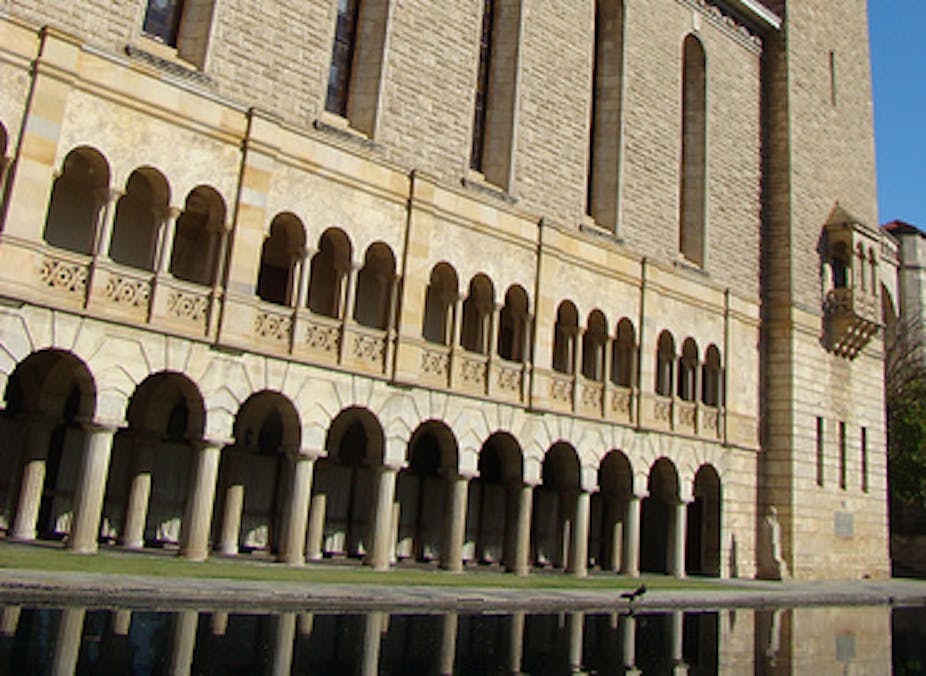Foundation Essay – Universities are at permanent risk of getting a bad rap.. They are too remote, too elitist, too unworldly, too expensive (especially in the US). They are ‘irrelevant’ to the needs and cries of the times. As a prominent provincial businessman, who, of all things was sponsoring an art prize I was judging, remarked: “It’s plumbers not PhD’s we need.” The Antipodean ‘university of hard knocks’ has many disgruntled alumni.
These standardized complaints have recently received sanction at the highest level. Lord John Browne’s report on higher education in the UK recommended that government funds should be directed to those disciplines which could demonstrate clear economic impact and benefit to the state - science and technology, economics and business, law and medicine. Lord Browne could see no point in funding the arts and the humanities even though during his tenure as chairman of BP, the company was a generous and enlightened patron of the arts. Although these views have produced the predictable hand-wringing debate, the Cameron-Clegg government appears set to adopt them.
I am sure, or maybe just hopeful, that universities fight back against such philistinism but few Vice-Chancellor’s are in a position to bite the hand that may toss them a few scraps of sustenance. Taking on the universities and cutting their funding brings out an authoritarian strain in social democratic governments. “Don’t worry: we’ll cut them down to size, those pampered academics and idle students” plays well with the complainers.
Impassioned public demonstrations such as London saw last autumn and Wisconsin this past winter, to say nothing of the Arab Revolt of 2011, may advance some change but one wonders…
More effective lines of argument and action lie in universities demonstrating publicly that part of their enterprise is directed at the wider comunity along with some of its resources. In one sense universities have done that all along. Public lectures by eminent visiting scholars and intellectuals have been standard operating procedure for the past sixty years. As an undergraduate, I heard and can still vividly recall public lectures to packed audiences by the likes of Sir Herbert Read and Mario Praz amongst others. But something more systemic, less adventitious, is required of universities if they are to demonstrate their value (and their values) to the wider community. There has to be a way of presenting the very best of the university’s reaching and research in a palatable form to a lay audience.
One finds little resistance to such thinking within the academy. Over the past four years I have directed the Festival of Ideas at the University of Melbourne. The first Festival in 2009 was on Climate Change/Cultural Change. When I was developing the idea and planning the event, I talked to a variety of scientists and social scientists for whom climate change was a major pre-occupation. Without exception everybody I met talked about the social dimension of their work; each expressed a strong wish to get the story out there and into the public domain. It was as though they wanted to to open their laboratories onto the street. And so it has proven again with the second Festival of Ideas for June 2011 on the theme The Pursuit of Identity: Landscape, History and Genetics. The geneticists - be they in medical, biological, botanical or agricultural reseach - want to explain and demonstrate the social ramifications of their work, how it changes our view of ourselves and promises to re-shape the world.
The very notion of a bi-annual Festival of ideas - largely the branchild of the Vice-Chancellor, Professor Glyn Davis - is predicated on the idea of placing the best of academic discourse before the public, acting out publicly the values of the university. For five days anybody who remembers to register at ideas.unimelb.edu.au can hear such eminent minds as Douglas Hilton, Director of the Walter and Eliza Hall Institute or Ary Hoffmann, the leading botanist of his generation or such distinguished historians as Sir David Cannadine and Linda Colley, both from Princeton, or such prominent Australian writers and intellectuals as Tom Keneally on the Australian Identity Today or Gareth Evans on National Identity and Global Conflicts. The enterprise of the University is to take ideas to the marketplace and I don’t mean Wall St.
Two further points should be made. First, one of the ironies of of university life is that you can have outstanding scholars, scientists and critics in fields ranging from the French Revolution to the genetic modification of seeds to the work of James Joyce and yet few beyond their immediate circle of students and colleagues ever gets to hear them lecture or discuss their field.The Festival supplies such a platform.
Second, the Festival brings scholars and scientists, artists and performers from outside Australia and from around its far flung cities and centres of learning. No single university, no matter how distinguished, has a monopoly on the best thinking across all disciplines. But it can reach out and tap the best minds across the global spectrum of learning and put that at the feet of its local community.
This Foundation Essay is part of a series of articles to mark the launch of The Conversation. Others in the series are:
Better connecting the university to the public debate by Glyn Davis
When the science is so clear, why is the argument so clouded? By Ross Garnaut
A better formula for science communication By Peter Doherty
The science of reporting climate change By Brian McNair
How universities learnt a lesson in humility — and are all the better for it By John Keane
The modern university must reinvent itself to survive By Simon Marginson

